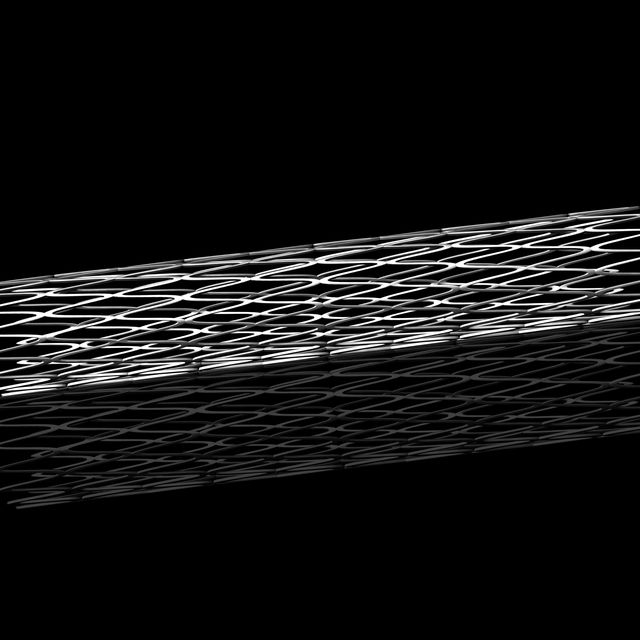Each year, nearly a million Americans undergo implantation of heart stents. These tiny, wiry tubes of woven metal help prop open the coronary arteries, which supply the heart muscle with blood. Though it seems like more blood flow to the heart would always be better, the final verdict on stents is more complicated. In some cases, you’re better off just saying no.
Stents have become common because, in some cases, they really are lifesaving. During most heart attacks, one of the coronary arteries becomes completely clogged and unable to deliver oxygen-rich blood to the heart. If the artery isn’t promptly re-opened, the affected part of the heart degenerates into useless mush. Because stents are the most efficient and durable tools for re-opening arteries, they’re almost always the best treatment for heart attacks. In fact, the sooner a stent can be deployed, the better the outcome is likely to be. So the next time you develop crushing chest pain, don’t waste any time calling for an ambulance.
 LONDON_ENGLAND//GETTY IMAGES
LONDON_ENGLAND//GETTY IMAGES
Unfortunately, stents can also create problems. First, to prevent blood from sticking to a stent, you’ll need to take a daily aspirin for the rest of your life. You’ll also need to take a second blood-thinning medicine for at least a few months. During this time, you’ll be more prone to bleeding. Alas, if you quit the medications too early, the stent can quickly clot and take down the entire artery again. And even if you’re perfect with your pills, your body can slowly sabotage the stent by depositing multiple layers of cells on its inner surface – which has the same effect as a hundred coats of paint on your bedroom walls. Over time, you could eventually need a second stent to prop open the first one.
Advertisement – Continue Reading Below
MORE FROM MEN’S HEALTH
Given the risks associated with stents, there are two common scenarios when you should think twice before letting a cardiologist permanently install one in your heart:
Say-No Scenario #1: Your heart attack was a while ago
A stent won’t be helpful when you’ve already had a heart attack and didn’t get prompt treatment. The coronary artery may still be blocked, but the heart muscle it supplies could already be dead. And there’s no point restoring blood flow to dead muscle. Unfortunately, you can’t just poke that part of the heart to see if it’s really dead, so doctors instead perform a special test called a viability scan. This scan distinguishes dead areas in the heart cells from ones that are simply hibernating – and might spring back to life with more blood flow. If the scan is positive, a stent can be helpful. If it’s not, don’t bother.
Say-No Scenario #2: Chronic chest pain
If your chest often aches during physical exertion, it may be because one of your coronary arteries is narrowed. As a result, part of the heart muscle isn’t getting enough blood when it’s working hard, and it generates pain so you’re forced to sit down and let your pulse drop back to normal. A stress test usually confirms the diagnosis.
Though it seems intuitive that opening the artery back up would relieve your pain, recent studies indicate that medications can provide equivalent relief and overall outcomes. The most effective ones are beta blockers, nitrates, and ranolazine. (You should also, of course, take steps to lower your blood pressure and cholesterol. And if you smoke cigarettes, you should obviously quit.)
 SCIEPRO/SCIENCE PHOTO LIBRARY//GETTY IMAGES
SCIEPRO/SCIENCE PHOTO LIBRARY//GETTY IMAGES
The exceptions
Of note, there are two exceptions when a stent may be a better choice for chronic chest pain. First, if your pain isn’t controlled with pills, or you don’t like the pills’ side effects, a stent is a good option. Second, if your pain is coming from severe blockages in high-risk locations – like the left main artery, which nourishes more than half of your heart, or in all three coronary arteries – you may need stents or even bypass surgery to lower your long-term risk of bad events, like heart attacks or death.
Like all medical treatments, stents have pros and cons. They’ve been hailed as miracle treatments – and, at times, they really are. But they’re not the solution to every problem, and you owe it yourself (and your heart) to make sure you don’t have a better alternative.
Christopher Kelly, M.D. is a senior clinical fellow at NewYork-Presbyterian Hospital/Columbia University Irving Medical Center. Marc Eisenberg, M.D. is an associate professor of medicine at the Columbia University Medical Center and an attending physician at NewYork-Presbyterian Hospital/Columbia University Medical Center. They are co-authors of the recent book, AM I DYING?!: A Complete Guide to Your Symptoms and What to Do Next.




